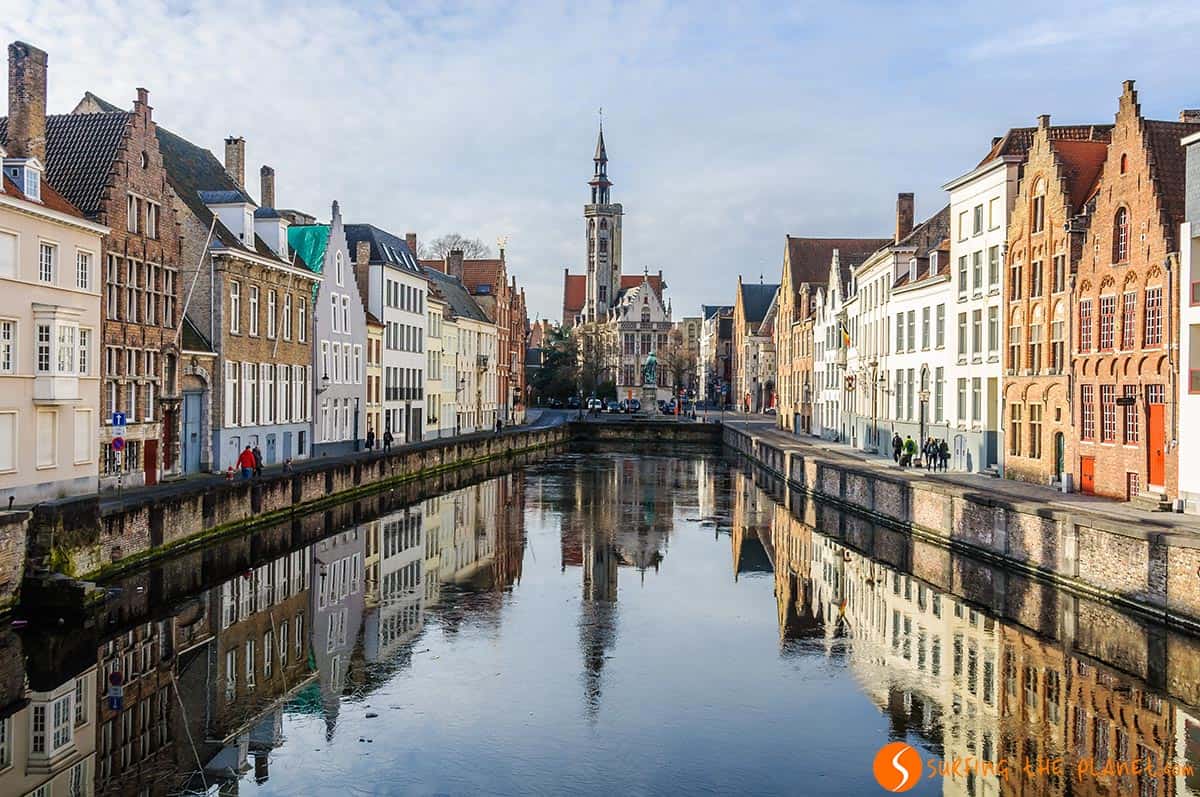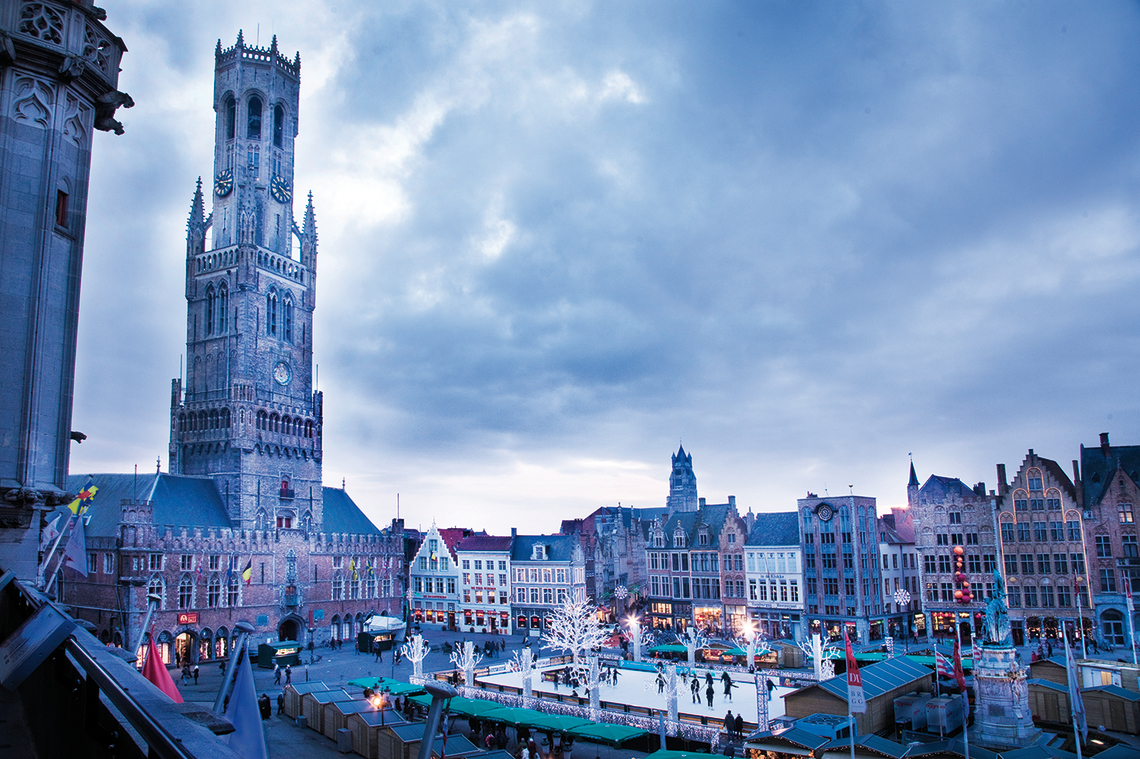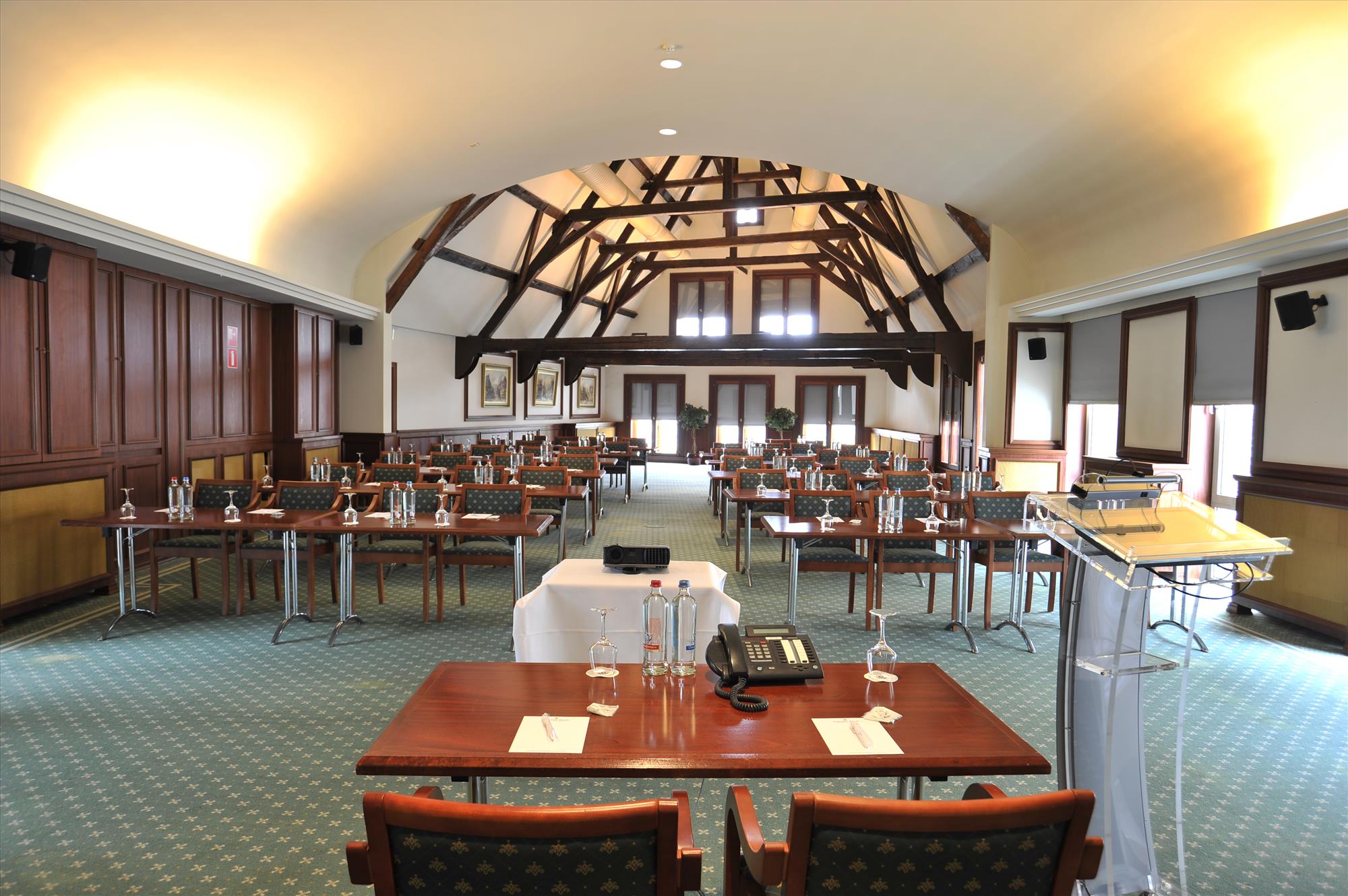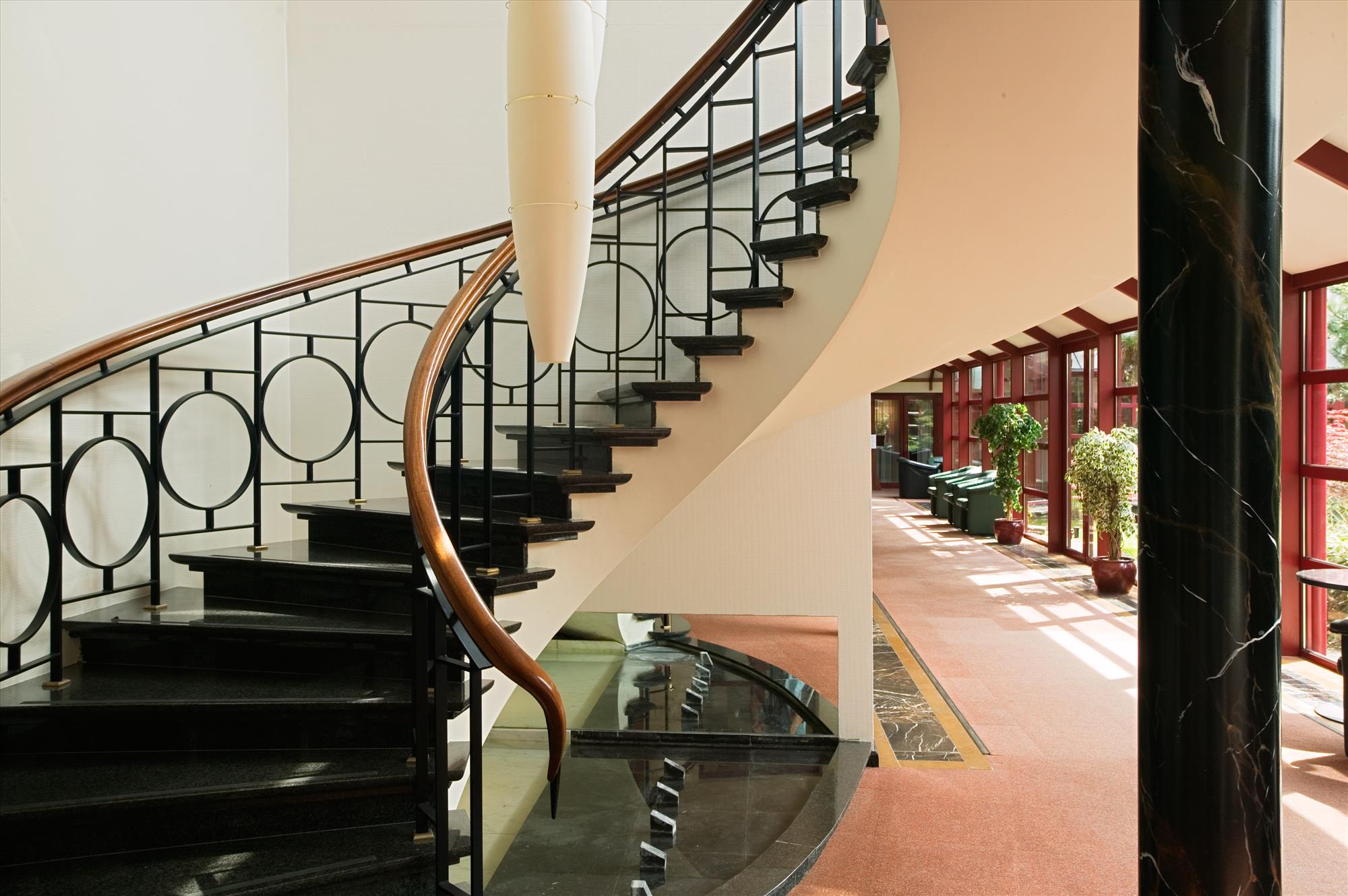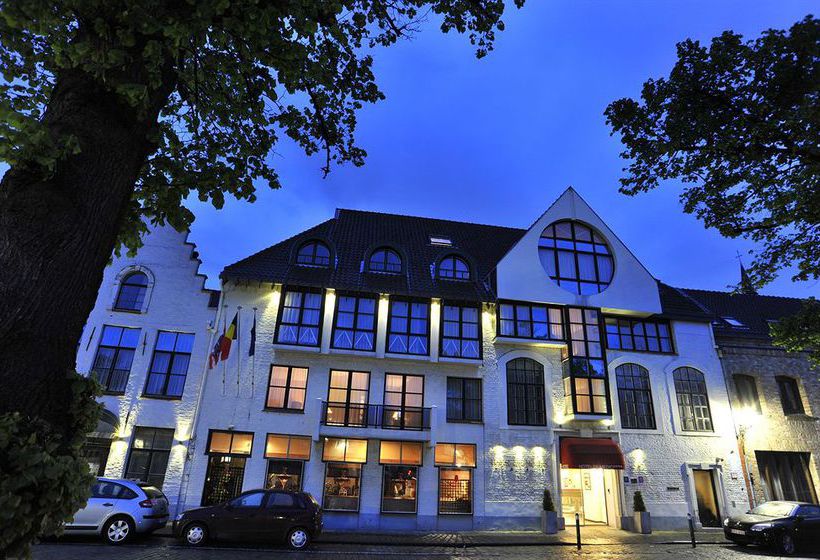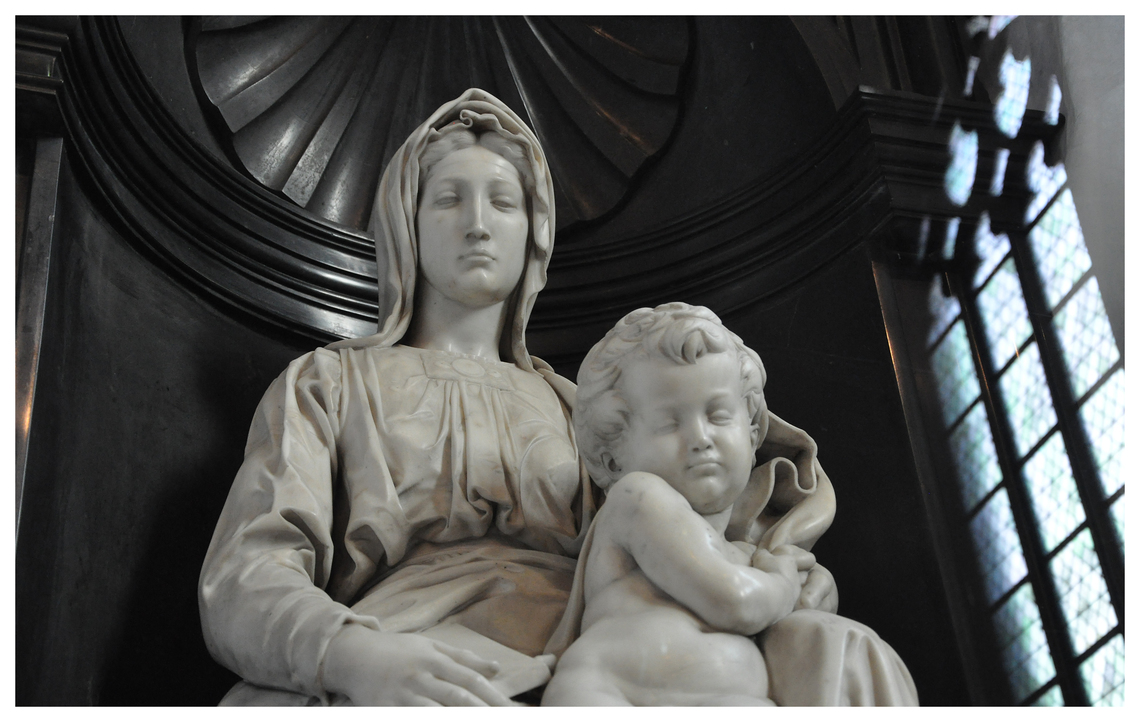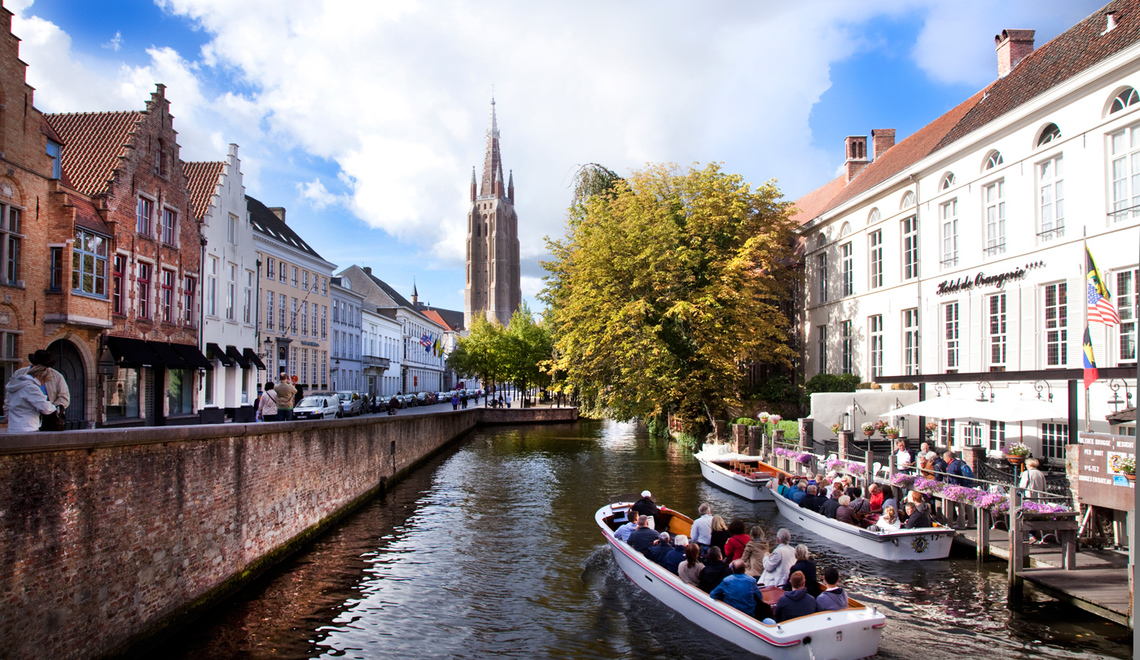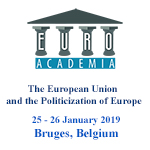Hotel de Medici
Potterierei 15B-8000 Bruges, Belgium
Conference Room: Firenze
Conference Agenda
- January 25, 2019
- 08:30 - 09:00Registration & Welcome Coffee (Registration Desk – Conference Room)
- 09:00 - 10:30Welcome and Opening Remarks / Opening Workshop: The EU and the Politicization of Europe
- 10:30 - 11:00Coffee Break & Snacks
- 11:00 - 13:00Panel 1: Populism, Nationalism and Right-Leaning Parties in Europe
- 13:00 - 14:30Lunch (Hotel de Medici Restaurant)
- 14:30 - 16:30Panel 2: Populism, Nationalism and the Political Crisis of Europe: Assessing the Narratives, Conditions and Impact of Brexit
- 16:30 - 17:00Coffee Break & Snacks
- 17:00 - 19:30Panel 3: The Eurozone Crisis, Economics & Policy Making: Transformative Impact on the European Project and Model(s) of Capitalism
- 19:30 - 20:00Welcome Drink
- 20:00 - 21:00Optional Social Dinner Out in Bruges
- January 26, 2019
- 08:15 - 08:30Welcome Coffee
- 08:30 - 10:30Panel 4: Thinking Europe: Philosophy, Intellectual History and Cultural Autonomy
- 10:30 - 11:00Coffee Break & Snacks
- 11:00 - 13:00Panel 5: Art as Cultural Diplomacy: (Re)Constructing Notions of Eastern and Western Europe
- 13:00 - 14:30Lunch (Hotel De Medici Restaurant)
- 14:30 - 16:30Panel 6: The Crisis of Europe and its Political Challenges: Assessing the EU’s Legitimacy Crisis and Perceptions from ETS Negotiations to Asylum and Migration Policy
- 16:30 - 17:00Coffee Break & Snacks
- 17:00 - 19:00Parallel Sessions: Panel 7: Assessing the EU’s Normative Influence and External Perceptions
- 17:00 - 19:00Parallel Sessions: Panel 8: Identity in the Visual: The Visual Turn and Identity Making Practices
- 19:00 - 19:30Closing Session: Concluding Remarks and Discussions
- 19:30 - 21:00Optional Social Dinner Out in Bruges
- January 25, 2019
The European Union and the Politicization of Europe (7th Edition)

- Conference Description
- Participant’s Profile
- Registration and Fee
- Social Activities and Publication
- Important Dates
- Venue and Directions
- Conference Program
- Panel 1
- Panel 2
- Panel 3
- Panel 4
- Panel 5
- Panel 6
- Panel 7
- Panel 8
The 7th Euroacademia International Conference
The European Union and the Politicization of Europe
25 – 26 January 2019
4* Hotel De Medici, Bruges, Belgium
Conference Description
The European Union was described by Jacques Delors as an ‘unidentified political object’ and by Jose Manuel Barroso as the first ‘non-Imperial empire’. The descriptors assigned to the European Union are creative and diverse. Yet, the agreement on what is the actual shape that the EU is taking is by no means an easy one to be achieved. Historical choices shaped and reshaped the size and functioning of the EU. The goal of an emerging ‘ever closer union’ is still in search for the paths of realization while pragmatics compete with ideal goals setting. The agreement seems to come when it’s about the growing impact of the decisions taken in Brussels on the daily lives of the European citizens and the increasingly redistributive outcomes of the policy choices inside the EU. These dynamics created the framework for the politicization of Europe and opened a vivid debate about the direction and proportions of such a process.
The politicization of Europe is a process that takes various shapes and addresses significant puzzles. While it is clear that the EU doesn’t resemble a state, it is less clear if the decisions that shape its policies are configured by Pareto efficient outcomes or by dynamics that are intrinsic to a political system and defined by emerging party politics within the European Parliament. The democratic problem or the democratic deficit issue was and continues to be one of the main challenges facing the European Union in any terms or from any position is understood or described. As some argue, the lack of fully democratic procedures led to Brexit while many European citizens largely are disenchanted with the way decisions are made in the EU. The problem of accountability for the decision making inside the EU was there from the beginning and it emerged gradually as more emphatic on the agenda of vivid debates as the powers of the EU have grown after the Maastricht Treaty. This was concomitant with a growing disenchantment of citizens from member states with politics in general, with debates over the democratic deficits inside member states, with enlargement and with a visible and worrying decrease in voters’ turnouts at both national and especially European elections. To all that, recent times added the economic crisis and a re-emergence of nationalism in many European countries and an increase in anti-EU sentiments. The optimist supporters of EU believe in its power to constantly reinvent and reshape in deepening integration while the pessimists see either a persistence of existing problems or a darker scenario that could lead in front of current problems even to the end of the EU as we know it.
The 7th International Conference ‘The European Union and the Politicization of Europe’ aims to survey some of the current debates in EU studies and addresses once more the challenges of the EU polity in a context of multiple crises that confronted Europe in recent years. It supports a transformative view that invites to dialogue balanced weights of optimism and pessimism in a belief that the unfold of current events and the way EU deals with delicate problems will put an increased pressure in the future on matters of accountability and will require some institutional adjustments that address democratic requirements for decision making. However in its present shape and context the EU does not look able to deliver soon appropriate answers to democratic demands. In a neo-functionalist slang we can say as an irony that the actual crisis in the EU legitimacy is a ‘spillover’ effect of institutional choices made some time before. To address the EU’s democratic deficit however is not to be a skeptic and ignore the benefits that came with it but to acknowledge the increasing popular dissatisfaction with ‘occult’ office politics and with the way EU tackles daily problems of public concern while the public is more and more affected by decisions taken at the European level. The question to be addressed in the conference is weather the increasing politicization of the EU will lead to a full democratization of EU politics or to increasing fragmentation and division. Of course, the scenarios regarding the future of the EU, the impact of Brexit and re-emerging nationalism and far right politics will be at the center of the debate in the conference.
Is the EU becoming an increasingly politicized entity? Is the on-going politicization of Europe a structured or a messy one? Do political parties within the European Parliament act in a manner that strengthens the view of the EU as an articulate political system? Are there efficient ways for addressing the democratic deficit issue? Can we find usable indicators for detecting an emerging European demos and a European civil society? Does a Europeanization of the masses take place or the EU remains persistently a genuinely elitist project? Did the Lisbon Treaty introduced significant changes regarding the challenges facing the EU? Can we see any robust improvements in the accountability of the EU decision making processes? Are there alternative ways of looking at the politicization processes and redistributive policies inside the EU? What is the impact of Brexit for the future of the EU? Can we expect a future of European solidarity or division? These are only few of the large number of questions that unfold when researchers or practitioners look at the EU. It is the aim of the 7th International Conference ‘The European Union and the Politicization of Europe’ to address in a constructive manner such questions and to offer a platform for dissemination of research results or puzzles that can contribute to a better understanding of the on-going process of politicization within the European Union.
The conference welcomes papers advancing contributions from the widest area of inquiry related to the EU, from theoretic contributions and methodological proposals to case studies at EU level and regional or national levels. It aims to be an interdisciplinary event that adds value to the debate about the present and future of the EU based on the firm belief that deepening the specialized dialogue on EU topics leads to asserting the European critical thinking and to a better understanding of European realities. Papers addressing current challenges from the Eurozone crisis to Brexit or re-emergence of nationalist parties and attitudes in member states as well as security studies and IR papers are especially welcomed.
Participant’s Profile
The conference is addressed to academics, researchers and professionals with a particular interest in Europe, Europe related and European Union topics from all parts of the world. As the nature of the conference is intended to be multidisciplinary in nature, different academic backgrounds are equally welcomed. Cultural approaches, political studies, critical studies, out of mainstream approaches and artistic/literary contributions to the better understanding of Europe in its past present and future dimensions are all equally welcomed. Euroacademia favors alternative and innovative thinking proposals and non-mainstream methodologies.
Post-graduate students, doctoral candidates and young researchers are welcomed to submit an abstract. Representatives of INGOs, NGOs, Think Tanks and activists willing to present their work with impact on or influenced by specific understandings of Europe and/or the European Union are welcomed as well to submit the abstract of their contribution.
Abstracts will be reviewed and the participants are selected based on the proven quality of the abstract. The submitted paper for the conference proceedings is expected to be in accordance with the lines provided in the submitted abstract.
Registration and Fee
Registration process is now closed
The Participation Fee Includes:
- the registration fee
- participant’s package with all the materials for the conference
- full access to the conference proceedings
- eligibility for inclusion in the conference proceedings published volume
- a copy of the published volume
- access to Euroacademia discussion group and newsletters
- coffee brakes for all the duration of the conference
- welcome drink in Bruges on 25th of January 2019
- a 3 course lunch on 25th of January 2019 at 4* De Medici Restaurant
- a 3 course lunch on 26th of January 2019 at 4* De Medici Restaurant
- certificate of attendance
- access to optional social program
Unfortunately, Euroacademia has no available funds for covering transport and accommodation to/in Bruges. Participants are responsible for securing funding to cover transportation and accommodation costs during the whole period of the conference. Official invitation letters can be sent by Euroacademia to the financing institutions of selected participants to confirm the selection and participation in the conference upon request. Preferential rates are offered to participants willing to book their accommodation at the 4* Hotel de Medici – the conference venue.
Social Activities
A specific spot in the conference program will be dedicated to social networking and therefore all the participants interested in setting or developing further cooperation agendas and prospects with other participants will have time to present and/or promote their project and express calls for cooperation.
A specific setting (Social Corner) for promotional materials connected with the topic of the conference will be reserved for the use of the participants. Books authored or edited by the participants can be exhibited and promoted during the whole period of the conference and can also be presented within the conference package based on prior arrangements.
Photos and videos will be taken during the conference and the organizers will consider through the participation of selected presenters or members of the audience that the agreement for being photographed or filmed during the event was granted through registration to the event. Please notify the organizers in written form prior to the the event if you are a confirmed participant and would prefer otherwise.
An optional dinner and a social event will be organized for the first and second evenings of the conference in a typical Flemish cuisine restaurant as optional program for the willing participants. The social dinner will be held based on participant’s confirmation and its costs are to be covered individually by participants based on individual order.
Publication:
Selected papers will be published in an electronic volume with ISBN after the confirmation of the authors and a double peer-review process based on an agreed publication schedule. All the papers selected for publication should be original and must have not been priory published elsewhere. All participants to the conference will receive a copy of the volume.
Specific selected papers will be also published in CEJISS (Central European Journal of International & Security Studies)
About CEJISS
Formally launched in January 2007, CEJISS is designed as a double-destination scholarly bridge. The first bridge was constructed with Central Europe (Czech Republic, Hungary, Poland and Slovakia) in mind, focusing on increasing the audience for Central European scholars. In this regard, CEJISS is making a substantial impact as each issue attracts attention in some 45,000 people in nearly 160 countries. However, CEJISS is not Central European centric and invites scholars from around the world to contribute. This has meant that just as Central European scholars now have an easier time gaining a footing outside of the region, so international scholars also have an easier time getting in and making an impact here. With a mere two decades separating our times from the ‘darker’ Cold War years, CEJISS aims to contribute English language perspectives to the peoples of Central Europe and give the latter the amplification their research deserves.
| Important Dates | |
|---|---|
| 1st of December 2018 | Deadline for Submitting Panel Proposals |
| 10th of December 2018 | Deadline for Paper Proposals: 300 words abstracts and details of affiliation |
| 11th of December 2018 | Latest notification of acceptance |
| 15th of December 2018 | Sending the Registration Form |
| 21st of December 2018 | Payment of the conference fee |
| 10th of January 2019 | Sending the draft paper to be uploaded on the conference website |
| 15th of January 2019 | Publication of the conference program and uploading the draft papers on the website |
| 25th of January 2019 | The conference commences at 8.30 am |
Venue and Directions
The conference will take place in the conference premises of the high standard 4* Golden Tulip Hotel De Medici, located on one of the most romantic canals of Bruges, only few minutes walking distance from the main Market Square in the center. Bruges is a renowned city for its superb center, its museums, its restaurants and its pleasant shopping streets. The city of Jan van Eyck, Bruges is also called “Venice of the North” because it has numerous canals which cross the city. The historic city center of Bruges is a prominent World Heritage Site of UNESCO and an iconic surrounding for many movies. Bruges has most of its medieval architecture intact, making it one of the most well-preserved medieval towns in Europe.
The 4* Golden Tulip Hotel De Medici is a modern hotel set on the canal side by a stone bridge, in an 11-minute walk from the main Grote Markt square and the adjacent medieval Belfort belfry. During Bruges’ Golden Age, the 15th century, the fine arts prevailed. In the wake of the prestigious Burgundian dynasty, the great Flemish Primitives made a name for themselves. The world-renowned works of Jan Van Eyck, Hans Memling and those of other prominent Flemish Masters can be admired at the Groeninge Museum, St John’s Hospital, St Saviour’s Cathedral and the Church of Our Lady. Michelangelo’s world famous ‘Madonna and Child’ can also be found in the Church of Our Lady.
Hotel de Medici
Potterierei 15
B-8000 Bruges, Belgium
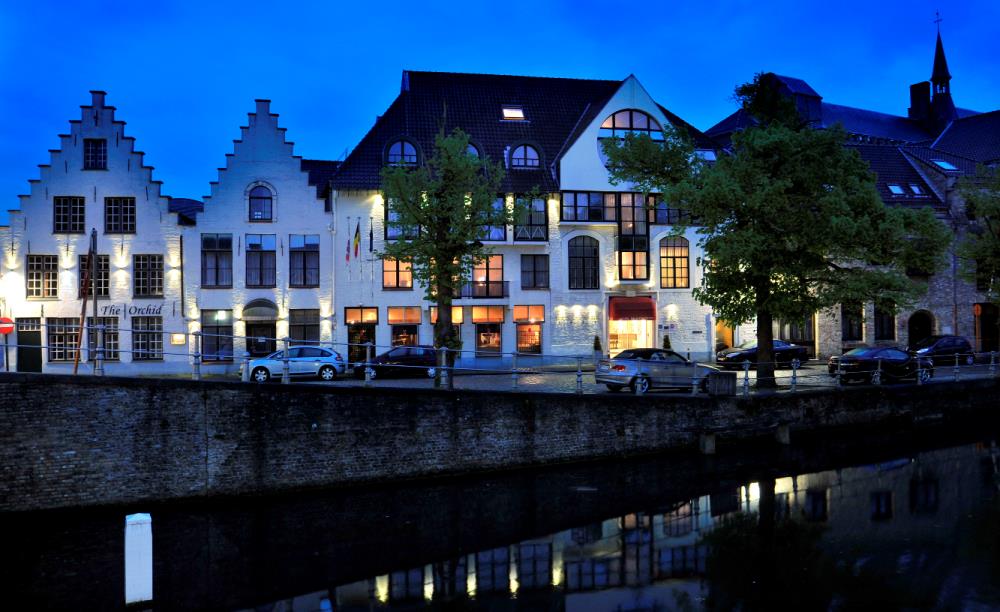
How to get to Bruges
By Plane
The national Brussels Airport, one hour away by train or car, offers the best connections. A large number of carriers offer direct flights to Brussels. Belgium’s main airport has its own railway station. Bruges can easily be reached through the airports of Brussels, Charleroi (Brussels South) and Lille, so getting to Bruges by train is by far the easiest way. Direct trains from Brussels Airport are scheduled every hour. From Charleroi Airport there is an Express Bus to Bruges station. The nearest airport to Bruges is the Ostend-Bruges International Airport in Ostend (around 25 kilometres (16 miles) from the city centre of Bruges), but it offers very limited passenger transport and connections.
By Train
Traveling to Bruges on Belgium’s excellent rail system is a natural choice. Trains to and from Brussels leave every 30 minutes during the day. The journey from Brussel-Zuid (a.k.a. Bruxelles-Midi if you prefer French to Dutch) to Bruges takes about 50 minutes. Brugge is not the terminus, look for trains going to Oostende or Blankenberge. If you are traveling on the Eurostar that same day, you can get a cheap add-on ticket to “Any Belgian Station”. Otherwise, buy a ticket when you get to the station.
See full information about the conference Location & Map:
HERE
Conference participants are responsible for arranging the accommodation and travel to/in Bruges.
Conference Program
The Conference Agenda is available in the right sidebar of this page.
The extensive conference program with abstracts and available draft papers is accessible below by clicking on the panel number tabs and links of individual presentations.
Populism, Nationalism and Right-Leaning Parties in Europe
- Left Problems, Nationalism and the CrisisIn spite of the rise of Jeremy Corbyn’s Labour party, emboldened nationalism remains at the centre of British politics. After all, much of the past decade had seen nationalism become the most reliable broker of electoral power. It had informed the rise of far-right populisms whilst also fortifying centre-right rule. These nationalisms manifest along multiple registers. Our talk will provide a historically attuned analysis of the relationship in Britain between the current crisis and xeno-racist nationalism, including an engagement with the myths surrounding whiteness and the working class. It is our wider argument that this repudiation can only manifest through a solid understanding of the contemporary crisis in which these nationalisms arise.Malcolm James, University of Sussex, UKSivamohan Valluvan, University of Warwick, UK
- Looking at Right-Wing Nationalism with a Longer Term Perspective: The Lega in ItalyThe Lega, founded in 1991 under the name Lega Nord, is amongst the oldest populist and Eurosceptic parties in Europe. An analysis of the history of the party and the evolution of its political discourse allows a better and more context-embedded understanding of its Euroscepticism, especially since in its early years the party’s programme was rather pro-European. he Lega’s sometimes contradictory stances on Europe are the outcome from conflicting dynamics that guide the party’s politics.Michel Huysseune, Vrije Universiteit Brussel / Université Libre de Bruxelles, Belgium
- Populists in the Parliaments: A Comparative Analysis of Populist Parliamentarian Behaviour Concerning European IntegrationThe subject of my paper is the populist political discourse about European integration within the parliamentary Committees of the Member States. The member states on which I have conducted my analysis are Italy, Austria, and the Netherlands. As selection criterion, I used Arend Lijphart's classification that puts them in the category of consociational democracies. The present work demonstrates the complexity of the European integration discourse and the contradictions present in the single parties and coalitions, the diversity of approaches between the forces of the different states, and the weight of national interests on populists’ political claims.Federico Bonomi, St Antony’s College, University of Oxford, UK
- The Rise of Ethno-nationalist Populism in SloveniaThis paper suggests that the process of establishing independent statehood were largely based on right wing populist parties’ attempts to differentiate the Slovenian national identity from anything that is seen or considered as Balkan, which became a metaphor for backward and primitive. Exclusionary populism intensified over the last two decades, which will be shown in the paper by employing the case study analysis of the Slovenian Democratic Party (SDP).Iztok Šori, Peace Institute, Ljubljana, SloveniaMojca Pajnik, Peace Institute, Ljubljana, Slovenia
Populism, Nationalism and the Political Crisis of Europe: Assessing the Narratives, Conditions and Impact of Brexit
- Are “Brexiters” Indeed the Bad Guys? What Can We Learn from the Modern Game Theory and Economics of Federalism?The paper presents the game theoretical explanation for the Brexit and offers a set of the economic criteria that may be used by the EU policy-makers in order to mitigate the current crisis and to construct an efficient institutional framework on the vertical and horizontal division of competences to address the growing EU’s democratic deficit. The paper also argues that growing political distortions and increasing politicization of the EU will lead to increasing fragmentation and division.Mitja Kovac, University of Ljubljana, Slovenia
- The Myth of a Liberal Brexit: How Brexiteers (Mis)Used History in their Quest for British ‘Freedom’Ultimately, this paper seeks to problematize and critique the relationship between the wartime British ‘underdog myth’ and the myth of reviving imperial ties, exposing them as fundamentally incompatible and ultimately inaccurate readings of British history. Throughout, the paper will seek to understand what a “liberal Brexit” actually means, and whether a historical approach can help us to understand such an idea.Alistair Somerville, BMW Center for German and European Studies, Georgetown University, USA
- The Role of Conservatism in Development of Right-Wing Populism in Western Democracies: UK CaseThe main part of conservative strategy was the co-optation of elements of the political course, first of all, the claim to hold a referendum on Britain’s withdrawal from the EU. Thus, the British case demonstrates that conservatism can play dualistic role. On the one hand, conservatism can act as an ideological resource of right-wing populism, ensuring its ideological equipment; while on the other hand, it can undertake effective strategies, such as co-opting a number of elements of a political course to reduce the electoral positions of right-wing populists.Shein Sergey, National Research University Higher School of Economics, Moscow, Russia
- Brexit, History and Education: Recognising Conflict in a Period of UpheavalThis paper seeks to interrogate the role of an international project about the representation of the past, during a period of historic social upheaval and uncertainty, by drawing on George Santayana's assertion (1905) that 'Progress, far from consisting in change, depends on retentiveness...Those who cannot remember the past are condemned to repeat it', and its misrepresentation in wider culture, in order to contextualise the contradictions posed by the project in a time of change and amnesia in the UK.Erin Bell, University of Lincoln, UKFlorian Gleisner, University of Lincoln, UK
The Eurozone Crisis, Economics & Policy Making: Transformative Impact on the European Project and Model(s) of Capitalism
- A Liberal Intergovernmental Approach to the Establishment of the European Stability MechanismUtilizing the research methods of congruence testing and process-tracing, this paper examines LI’s analytical and predictive power in explaining the creation of the ESM.Madeleine Hosli, United Nations University – CRIS, Bruges, Belgium / Leiden University, NetherlandsWen Pan, Sichuan University, ChinaMichael Lantmeeters, United Nations University – CRIS, Bruges, Belgium
- Monetary Policy at the Zero Lower Bound: The European Central Bank in the Realm of PoliticsThis paper reviews how the ECB’s exceptional monetary accommodation to fight persistent low inflation during 2013-2018 may trigger political intervention and a populist backlash.Ad van Riet, European Central Bank (Until end of 2018)
- The Policy-Mix In the Euroland – Challenges at the End of the Post-Crisis CycleThis paper applies standard econometric tools in order to assess the policy-mix in the Euroland over the past two decades, with a focus on the post-crisis cycle.Andrei Radulescu, Transylvania Bank and Romanian Academy, Bucharest, Romania
- Inequality, Macroeconomic Performance and Political Polarization: An Empirical AnalysisThe political gridlock may explain why economies experience slow recoveries from recessions and financial crises. This Paper investigates the determinants of political polarization with special focus on income inequality.Juan Carlos Peña, University of Bamberg, GermanyChristian R. Proaño, University of Bamberg, GermanyThomas Saalfeld, University of Bamberg, Germany
- Freedom as Non-Domination in the Eurozone: A Republican Assesment of the Eurozone Sudden-Stop CrisisBy bringing together macroeconomics and republican political theory, the paper explores the possibility that the conception of freedom as non-domination can be meaningfully applied to evaluate the Eurozone sovereign debt crisis.Stefano Merlo, John Stuart Mill College, VU Amsterdam, Netherlands
- The Impact of the Eurozone Crisis and its Regulation on the Decrease of European Bank MergersAs a consequence of this presentation, we will be able to infer the general reasons why European bank mergers fail by remaining few and apprehend if this phenomenon it to be attributed to the inefficiency of the Merger Monitoring Authorities.Evangelia Nissioti, University of Hamburg, Germany
Thinking Europe: Philosophy, Intellectual History and Cultural Autonomy
- The Public Realm and Contemplation in the Thought of Hannah Arendt and Jan PatočkaArendt and Patočka address history, philosophy, and the crisis of modern Europe with similar influences (chiefly Heidegger) and method, yet their understanding of how contemplation relates the European ideal of the public realm is incongruent. This paper will explore their points of divergence in order to gain insight into the threat they believed the European ideal of the public realm was facing in the 20th century.Daniel Clements, Institute of Philosophy, KU Leuven, Belgium
- Jürgen Habermas: The “Unfinished” European Project and the Claim of SolidarityThe paper highlights the concept of solidarity in Habermas’ most recent writings (2013-2015) on the European crisis, meant as a key-factor in order to solve it. The idea of political and civic solidarity, heir of the republican notion of fraternité, may fit into a transnational context such as Europe, because it specifically concerns stranger citizens in terms of morality and identity.Alessandro Volpe, Vita-Salute San Raffaele University, Milan, Italy
- Politicization of Europe without the Peoples of Europe?The mentions of the “peoples” of Europe can be seen as just another way of referring to the different sets of citizens, but we will defend that this persistence in the use of the word is related to recognizing that the political construction of Europe can’t neglect Community factors and that, in any case, that construction will not succeed if these factors are neglected.Carles José i Mestre, Department of Philosophy, University of Barcelona, Spain
- Measure and Limit: Thinking of Europe at the MeridianThis paper proposes the thesis that the philosophical idea of Europe includes in itself the concepts of Measure and Limit, which represent the relationship to the ‘otherness’, as is symbolically shown by the permeability of the Mediterranean sea and earth. The main philosophical and political responsibility of Europe doesn’t consist of the integration of its oceanic (Nordic) and Mediterranean (Southern) countries, but of measuring its differences and building bridges between the islands of its archipelago.Sandro Gorgone, Department of Philosophy , University of Messina, Italy
- Justice for EuropeThe purpose of this proposal is to present Jacques Derrida’s reflections on Europe, demonstrating that deconstruction does not remain enclosed in speculative discourses, but aspires to intervene in the world. In this “time of poverty” in which millions of people are knocking on the doors of Europe, it is our ethical and political responsibility to negotiate between the European imperatives of hospitality and the need for unconditional hospitality in every case.Valentina Surace, Department of Philosophy , University of Messina, Italy
Art as Cultural Diplomacy: (Re)Constructing Notions of Eastern and Western Europe
- The Role of Foreign Correspondents in Cultural and Science DiplomacyWith the European Union in general and different European countries in particular maintaining a strong focus on cultural diplomacy initiatives, it is imperative to explore how foreign correspondents covering art and culture as well as those initiatives affect the perception of the European Union and its member states to audiences abroad. The following research question then is explored: How do foreign correspondents shape the image of a foreign country or a multinational institution such as the EU to home audiences, particularly through coverage of art and culture and cultural diplomacy activities?George Terzis, Department of Communication Studies, Vrije Universiteit Brussel, BelgiumLinsey Armstrong, Syracuse University, New York, USA
- EU’s Civil Society Bias in the Neighbourhood: A Case Study on CultureThe analysis seeks to provide a case study with a thematic focus. It looks at EU cultural relations with Neighbourhood countries and in particular at EU’s financial and technical support to their cultural actors. The EU has developed a sound experience in supporting the cultural sector in ENP countries. However, this study seeks to enquire whether the boundaries of what cultural sector means for the EU are mostly based on a Eurocentric understanding of CS or rather on a more inclusive definition mediated with the nature of societies in partner countries.Riccardo Trobbiani, United Nations University – CRIS, Bruges, BelgiumDomenico Valenza, United Nations University – CRIS, Bruges, Belgium
- Propaganda or Cultural Diplomacy? Tarabya Cultural AcademyThis paper debates the Tarabya Cultural Academy, a culture and art institution initiated in 2011 by the then foreign ministers of the Federal Republic of Germany and Turkey. Its original purpose was to bring German and Turkish publics together, and create understanding between the two states. This paper will therefore debate Tarabya Cultural Academy, its artistic work and the blurred line between cultural diplomacy and propaganda in this context, focusing on specific artwork that has been created over the last two years (2016 – 2018).Firdevs Bulut, University College London, UK
- Contemporary Art Exhibitions as a Tool for the Democratisation of Europe Between 1989 and 2004This presentation will seek to problematise the use of contemporary art as a presumably neutral platform of dialogue between Eastern and Western European states, which supported the process of socio-political Europeanisation of the former East. At the same time, it will situate the aforementioned projects within the broader debates on the attempts to construct the post-ideological socio-political landscape of democratised Europe post-1989 through the means of contemporary art.Mateusz Sapija, Edinburgh College of Art, University of Edinburgh, UK
The Crisis of Europe and its Political Challenges: Assessing the EU’s Legitimacy Crisis and Perceptions from ETS Negotiations to Asylum and Migration Policy
- Avoiding a Legitimacy Crisis Despite the Quarrels: The EU in the Emissions Trading System NegotiationsFor a decade, the European Union (EU) has been struggling through different crises: it has difficulty recovering from the financial crisis; it seems unable to deal with the migration waves; and it has now to face Brexit. If it has been shown that the EU thrives in times of crisis, it is also true that the EU has never been faced with so many challenges at once and many scholars have concluded that the EU is currently facing a legitimacy crisis. This paper argues otherwise. Indeed, it shows that legitimacy and legitimacy crisis are distorted concepts that have lost their operational power.Claire Godet, ARENA Centre for European Studies, Oslo
- The (De)Politicization of Europe through the Migration CrisisWithin this paper we will demonstrate this inherent heterogeneity of the word “people” which was one of the reasons of the Euro-crisis. In this sense, do we need to form a European people, a European demos, who will accomplish the European project? If Europe is in crisis, this is also because of the paradox of legitimacy and democratization : in order to achieve legitimacy, we need to subordonate it to a democratization process and not a simple institutional objective. In other words, the distinction between input oriented legitimacy (legitimate political choices because they reflect the will of the people) and output oriented legitimacy (government for the people) shatters the foundation of the European identity.Roila Mavrouli, University of Luxembourg, Luxembourg
- The Media Reception of the Refugee Wave in the European Countries Outside the Schengen AreaThe phenomenological research of the media reception of migrants is an interesting challenge in itself, especially when it is limited to the area that brings its own specificities. Relating to the not so distant experience of the war on its own territory with numbers of its own refuges and relatively short-term membership in the European Union (while still outside the Schengen borders), the media reception becomes a key to the creation of a media audiences' attitude. The Croatian survey results regarding the various reporting methods on refugee problem and their influence on diverse perception of refugees, can help to understand the polarization of attitudes about the perhaps most problematic issue of the European Union.Gordana Tkalec, University North, Koprivnica, CroatiaIva Rosanda Žigo, University North, Koprivnica, Croatia
- Migration Outsourcing Management: Challenges and Perspectives of Usage in XXI CenturyThe proposal to offer migrants some legal opportunities to apply for visas or asylum in transit and origin countries out of the EU “frontline” states (so-called outsourcing asylum) seems to be a real pathway, gate-keeping mechanism, political and legal instrument to reduce the increasing flow of migrants and asylum seekers but not to stop migration to Europe. This gate-keeping mechanism might help to sort wanted migrants from unwanted not inside the EU, but in non-EU “frontline” states. This case is about national sovereignty and state security, but about human rights protection as such.Iryna Sofinska, National University ‘Lviv Polytechnic’, Ukraine
Assessing the EU’s Normative Influence and External Perceptions
- Assessing the Eurozone Crisis: Perspectives from the North-American MediaThis paper evaluates the prevailing narratives of the crisis as they are presented in the North American media. It assesses editorials and articles in four major newspapers (two American and two Canadian) in order to identify the similarities and differences in narratives presented in all four. Among other issues, the single market and the Euro created a power imbalance between European Union institutions such as the European Central Bank, market forces, and the political institutions of Eurozone members. The treatment of this imbalance by each of the four newspapers is of particular interest because such treatment defines who or what the North American media blames for the crisis and the solutions it suggests.Natalia Boliari, Manhattan College, New York, USA
- Optimism in a Contested Region – Forecasting the Future of the European Union and ArmeniaThis paper will present a forecast of Armenia-EU relations for the near future and new potential areas of cooperation. Most importantly, this paper will detail how the various crises facing the European Union (such as Eurozone instability, the spread of populism, and the fraying relations with Turkey) may jeopardize this relationship, and what policies may be enacted to alleviate this threat. This paper will include a brief review of relations between Brussels and Yerevan since 1991 alongside which policy areas that would conflict with Russian interests in the South Caucasus. The main legal basis of this study is the Comprehensive and Enhanced Partnership Agreement (CEPA), a treaty signed in late 2017 that is based on the cancelled 2013 Armenia-EU Association Agreement.Justin Tomczyk, Armed Conflict Location and Event Database Project (ACLED), Park Ridge, USA
- A European Failure? The European Union’s Policy Towards TransnistriaThe paper will argue that the EU can and must become more active in the Transnistrian resolution for several reasons. Firstly, even though the Transnistrian authorities are overtly pro-Russian, the European Union imports more Transnistrian goods than the Russian Federation. As Transnistria’s largest trade partner, the European Union can use economic pressure to influence a settlement between the breakaway region and Moldova. Since 2014, destabilisation in Ukraine has been a concern for the EU. The presence of an unrecognised state in Moldova not only potentially further destabilises the region, but it also brings the destabilisation much closer to Europe. The paper will demonstrate that the EU can and must become more engaged in the resolution process.Keith Harrington, NUI Travelling Scholar in Humanities and Social Sciences, Maynooth University, Ireland
Identity in the Visual: The Visual Turn and Identity Making Practices
- Yugoslavia on Instagram: The (Re)Construction of a Collective Identity from the PastSocial media represent a space that allows users to collect memories and, by sharing them, to connect with those who think and feel the same about the past. In this paper we analyze the intergenerational case of Jugonostalgija on Instagram where users are rebuilding a socio-cultural yugoslav sphere in a tension among ‘culture of nostalgia’ and ‘nostalgic culture’ (Velikonja 2008), playing different languages and aesthetics, producing content that refer to the same cultural references of the past. This allows them to respond to the need of reaffirming a common ‘we sense’, a feeling of belonging above the borders, prohibited by the national states. By a qualitative visual content analysis (Julien 2008) of 52 Instagram accounts related to Yugoslavia, we observed the generational relation between media and time in Jugonostalgija .Elisabetta Zurovac, University of Urbino Carlo Bo, ItalyGiovanni Boccia Artieri, University of Urbino Carlo Bo, Italy
- “Visability”. Visual Research on Abilities During the Jubilee of MercyNowadays pictures and video have become more and more popular in capturing, communicating and sharing social happenings with a massive impact on social practices and representation of reality. The research job aims to investigate the spreading of digital devices in a religious event when combined with a consistent presence of sickness and disability. In order to analyse this topic, a visual qualitative research study has been developed during the special Jubilee of Mercy that Pope Francesco dedicated to people affected by sickness and disability − Rome, 10-12 of June 2016 − in a perspective of observant participation. More than 2000 pictures from the researcher and the pilgrims from Catholic countries, note fields and about 70 interviews with pilgrims have been collected and then treated and analysedFrancesca Guarino, University of Bologna, Italy
- Visual Identity and the Human Crisis in Errementari: The Blacksmith and the DevilFilms represent a complex symptomatology of our culture. In this scope, moving images go far beyond a tangle of signs that the Saussurean tradition linguistics has depreciated for decades. Instead, they are able to point out important aspects of our visual identities. In contrast, independent and authorial films are capable of communicating agglutinations and possibilities of identification, establishing dialogues among alterities. My proposal is based on a semiotic-psychoanalytic approach that seeks to understand how the expression of monstrous forms appear in Errementari:The Blacksmith and the Devil (Paul Urkijo, 2016), produced by Àlex de la Iglesia.Adriano Messias De Oliveira, Pontifícia Universidade Católica de São Paulo, Brazil / Universitat Autònoma de Barcelona, Spain











